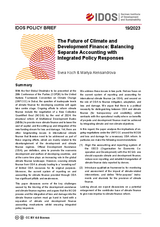Policy Brief
The future of climate and development finance: balancing separate accounting with integrated policy responses
Koch, Svea / Mariya AleksandrovaPolicy Brief (19/2023)
Bonn: German Institute of Development and Sustainability (IDOS)
DOI: https://doi.org/10.23661/ipb19.2023.v2.0
2nd, revised edition
The 1st edition is no longer available.
With the first Global Stocktake to be presented at the 28th Conference of the Parties (COP28) to the United Nations Framework Convention on Climate Change (UNFCCC) in Dubai, the question of inadequate levels of climate finance for developing countries will again take centre stage. Ongoing efforts to reform climate finance include the negotiation of a New Collective Quantified Goal (NCQG) by the end of 2024; the structural reform of Multilateral Development Banks (MDBs) to provide more climate finance and to lower the cost of capital; and the setting-up and integration of the new funding stream for loss and damage. Yet, there are other longstanding issues in international climate finance that likewise need to be addressed as part of these ongoing efforts, which are mainly related to the disentanglement of the development and climate finance regimes. Official Development Assistance (ODA), per definition, aims to promote the economic development and welfare of developing countries, and at the same time plays an increasing role in the global climate finance landscape. However, sourcing climate finance from ODA is already leading to a “crowding out” of limited ODA resources for its original purposes. Moreover, the current system of reporting on and accounting for climate finance provided through ODA has significant pitfalls and weaknesses. This paper discusses some of the key challenges caused by the blurring of the development assistance and climate finance regimes and argues that the NCQG process and the integration of loss and damage into the climate finance system must go hand in hand with a separation of climate and development finance accounting mechanisms whilst ensuring integrated policy responses. We address these issues in two parts: first we focus on the current system of reporting and accounting for international climate finance (as ODA); and second on the role of ODA to finance mitigation, adaptation, and loss and damage. We argue that there is a political necessity for distinguishing between ODA and climate finance (for transparency and credibility), which contrasts with the operational reality where co-benefits of projects and development finance must be achieved by integrating climate and non-climate objectives. In this regard, the paper analyses the implications of on-going negotiations under the UNFCCC around the NCQG and loss and damage for a necessary ODA reform. In particular, we make the following recommendations:
(1) Align the accounting and reporting system of the OECD (Organisation for Economic Co-operation and Development) with the NCQG: one should separate climate and development finance; reduce over-reporting; and establish triangulation of climate finance data reported by donors.
(2) Introduce qualitative frameworks for monitoring and assessment of the impact of climate-related interventions; and define “fit-for-purpose” instru-ments and channels for the provision of climate finance.
Looking ahead, we expect discussions on a potential enlargement of the contributor base of climate finance to give new impetus to climate finance reform.
Contact
Cornelia Hornschild
Publication Coordinator
E-mail Cornelia.Hornschild@idos-research.de
Phone +49 (0)228 94927-135
Fax +49 (0)228 94927-130
Alexandra Fante
Librarian/ Open Access Coordinator
E-Mail Alexandra.Fante@idos-research.de
Telefon +49 (0)228 94927-321
Fax +49 (0)228 94927-130





![[Translate to English:] Photo: Alexandra Fante, Bibliothekarin/Open Access-Koordinatorin](/fileadmin/_processed_/f/0/csm__c_Deutsches-Institut-fuer-Entwicklungspolitik_Fante_94ce4fa1ba.jpg)